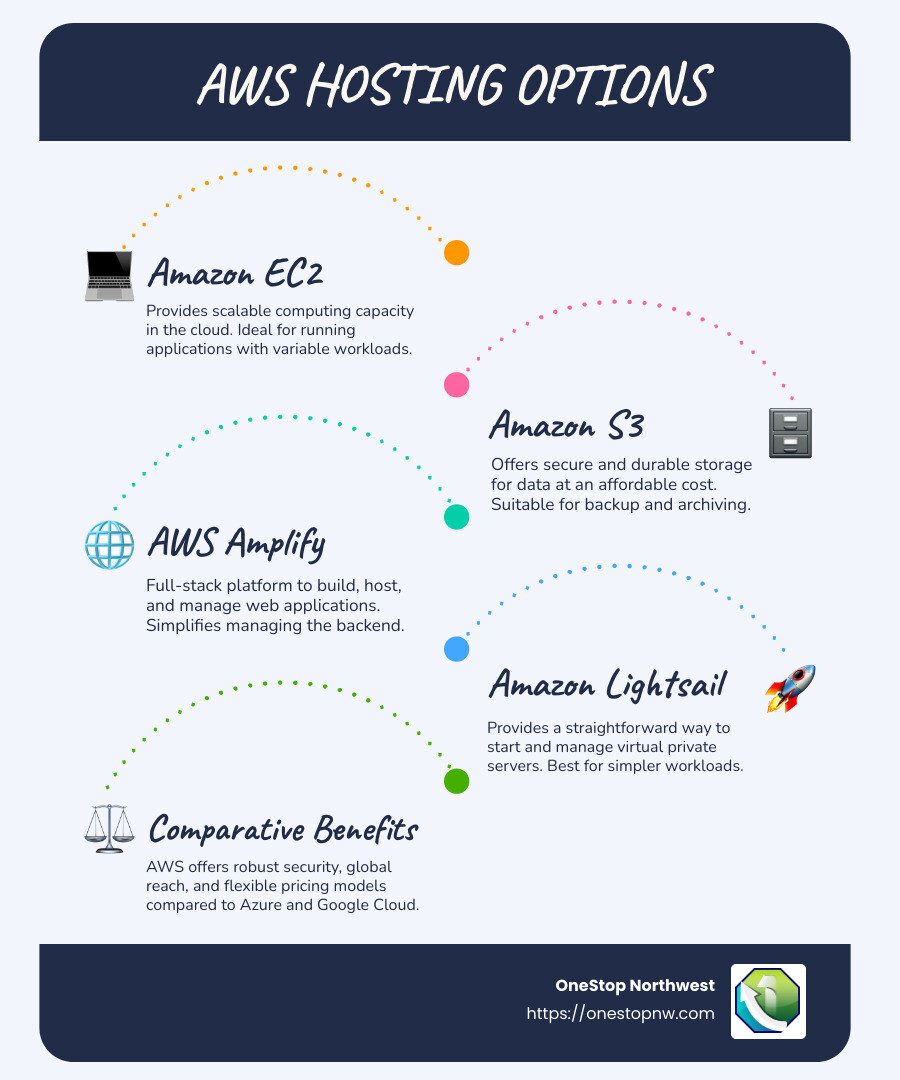AWS Hosting Options: Top 5 Essential Choices 2024
When it comes to understanding aws hosting options, cloud solutions offers a variety of custom services that cater to businesses of all sizes. Whether you’re a small business owner seeking reliable performance or a tech-savvy entrepreneur looking for scalable infrastructures, AWS hosting provides multiple platforms to meet your needs. Here’s a quick overview:
- Security & Performance: Robust safeguards and an impressive track record for uptime.
- Flexibility: Scalability to shift as your business demands change.
- Global Reach: Swift content delivery from servers worldwide.
Navigating these options can become overwhelming, but the AWS suite ensures your website is not only hosted efficiently but also manages data, performance, and security with expert-backed solutions.
As Dylan Cleppe, with decades of experience assisting businesses to harness technology effectively, I’ve witnessed the transformative power of aws hosting options firsthand. Transitioning to detailed insights, let’s explore how AWS’s cloud solutions can redefine digital presence for modern businesses.

Aws hosting options terms explained:
Understanding AWS Hosting Options
When it comes to AWS hosting options, you’re diving into a world of flexibility and scalability. Whether you’re running a small blog or a large enterprise application, AWS has a solution for you.
Cloud Hosting and IaaS
AWS provides cloud hosting services that fall under the category of Infrastructure as a Service (IaaS). This means you can rent virtual servers and storage from AWS instead of maintaining physical servers. This setup allows you to scale resources up or down based on your needs, making it a cost-effective option for businesses with fluctuating demands.
Key Benefits of AWS Cloud Hosting:
-
Scalability: Easily adjust resources to match traffic demands. This is crucial for businesses that experience seasonal spikes in traffic.
-
Reliability: AWS boasts nearly 100% uptime, thanks to its extensive global infrastructure. This ensures your website remains accessible to users around the world.
-
Security: AWS implements stringent security measures to protect your data, making it a trusted choice for businesses handling sensitive information.
Exploring AWS Hosting Options
AWS offers a variety of hosting services custom to different needs:
-
Amazon EC2: Provides scalable computing capacity. It’s ideal for dynamic websites and applications that require more processing power.
-
Amazon S3: Perfect for hosting static websites. It offers high durability and availability, making it a popular choice for simple sites like portfolios or blogs.
-
AWS Amplify Hosting: A fully managed service for deploying static websites and server-side-rendered applications. It simplifies the process of continuous integration and delivery (CI/CD).
-
Amazon Lightsail: A straightforward option for launching and managing virtual private servers. It’s designed for users who prefer a simplified approach to cloud hosting.
Why Choose AWS?
The power of AWS lies in its flexibility and the breadth of services it offers. For businesses looking to scale, AWS provides the infrastructure needed to grow without the hassle of managing physical servers. Plus, with a pay-as-you-go pricing model, you only pay for what you use, which can significantly reduce costs.
As you explore the AWS hosting options, consider how each service aligns with your business needs. Whether you need robust computing power or simple static hosting, AWS has a solution to fit your requirements.
Next, we’ll dig into the key AWS hosting services that can help you optimize your web presence.
Key AWS Hosting Services
When it comes to AWS hosting, there are four main services that stand out: Amazon EC2, Amazon S3, AWS Amplify, and Amazon Lightsail. Each service caters to different needs, ensuring there’s a perfect fit for every business.
Amazon EC2
Amazon Elastic Compute Cloud (EC2) is all about flexibility and control. It provides resizable compute capacity, making it ideal for businesses that need to scale resources dynamically. Whether you’re running a complex application or a high-traffic website, EC2’s pay-as-you-go model ensures you only pay for the capacity you use. It’s perfect for sites that require multiple servers and load balancing.
Key Features of Amazon EC2:
- Scalability: Easily adjust computing resources to meet demand.
- Flexibility: Choose from a wide range of instance types and configurations.
- Control: Full control over your server environment.
Amazon S3
Amazon Simple Storage Service (S3) is a top choice for static website hosting. It’s designed to store and retrieve any amount of data, offering high durability and availability. S3 is perfect for sites that don’t require server-side scripting, like portfolios or blogs. You can also use it with Amazon CloudFront to ensure fast content delivery globally.

Key Features of Amazon S3:
- Durability: 99.99% availability ensures your data is always accessible.
- Cost-Effectiveness: Pay only for the storage you use.
- Integration: Works seamlessly with other AWS services.
AWS Amplify
AWS Amplify is custom for developers who need a powerful platform for deploying static and server-side-rendered applications. It supports CI/CD workflows, allowing automatic builds, tests, and deployments. Amplify improves SEO and performance, ensuring faster page loads and better user engagement.
Key Features of AWS Amplify:
- CI/CD Integration: Streamlines the deployment process.
- Server-Side Rendering: Improves performance and SEO.
- Scalability: Easily scales with your application’s needs.
Amazon Lightsail
Amazon Lightsail is the go-to option for users who prefer simplicity and predictable pricing. It offers a bundle of essential features like compute power, storage, and networking, making it easy to launch and manage virtual private servers. With prices starting as low as $3.50 per month, Lightsail is ideal for small businesses and individuals.

Key Features of Amazon Lightsail:
- Ease of Use: Simplified setup and management.
- Predictable Pricing: Fixed monthly costs for easy budgeting.
- Integrated Features: Includes everything needed to start a web project.
Choosing the Right Service
Each of these AWS hosting options offers unique benefits, making it essential to align your choice with your specific needs. Whether you require robust computing power, simple static hosting, or a fully managed deployment service, AWS has the right solution for you.
In the next section, we’ll compare AWS hosting with other major providers, like Microsoft Azure and Google Cloud Platform, to help you make an informed decision.
Comparing AWS Hosting with Other Providers
When choosing a cloud hosting provider, it’s crucial to compare the big players: AWS, Microsoft Azure, and Google Cloud Platform (GCP). Each offers unique features and benefits, so let’s break down what makes them stand out.
AWS vs. Microsoft Azure
Microsoft Azure is one of AWS’s biggest competitors. Both offer a wide range of cloud services, but there are key differences:
-
Integration with Microsoft Products: Azure is tightly integrated with Microsoft products like Windows Server, SQL Server, and Microsoft 365. This makes it a popular choice for businesses already using these tools.
-
Hybrid Cloud Capabilities: Azure is known for its strong hybrid cloud solutions, allowing seamless integration between on-premises and cloud environments. This is ideal for companies needing a mix of both.
-
Pricing: Both AWS and Azure offer pay-as-you-go pricing models, but Azure sometimes provides more flexible options for enterprises, especially those already in the Microsoft ecosystem.
Quote from the Research: “Traditionally, businesses have had to build and maintain infrastructure to run on-premises applications. With the Software-as-a-Service (SaaS) model, businesses can consume applications that are hosted online” (source).
AWS vs. Google Cloud Platform
Google Cloud Platform is another strong contender. Here’s how it compares to AWS:
-
Data and Analytics: GCP excels in data analytics and machine learning services. Google’s expertise in search and data processing shines through its cloud offerings, making it a top choice for data-driven businesses.
-
Networking: Google is known for its fast and reliable global network infrastructure, which can lead to lower latency and faster data transfer speeds.
-
Pricing and Discounts: GCP often provides sustained-use discounts, which can be beneficial for long-term users looking to optimize costs.
Fact from the Research: “AWS uses its own cloud infrastructure to power Amazon.com, the most popular ecommerce platform today” (source).
Why Choose AWS?
While Azure and GCP have their strengths, AWS remains a leader for several reasons:
-
Market Leader: AWS was one of the first to offer cloud services and has a mature platform with a vast array of services.
-
Global Reach: With data centers across the globe, AWS ensures low latency and high availability for users worldwide.
-
Security and Compliance: AWS provides robust security features and compliance certifications, making it a trusted choice for businesses of all sizes.
Statistic from the Research: “AWS currently has dozens of data centers around the globe that are continuously monitored and strictly maintained” (source).
The choice between AWS, Azure, and GCP will depend on your specific needs, existing technology stack, and budget. In the next section, we’ll dive into the cost considerations for AWS hosting, including flexible pricing models and the AWS Free Tier.
Cost Considerations for AWS Hosting
When it comes to choosing a hosting provider, understanding the cost structure is crucial. AWS offers several pricing models that can fit various needs and budgets. Let’s explore these options.
Flexible Pricing
AWS is known for its flexible pricing. This means you can choose from different pricing models that suit your specific needs. Whether you’re a startup or a large enterprise, AWS provides options that can scale with your business.
-
On-Demand Pricing: Pay for compute or database capacity by the hour or second, with no long-term commitments. This is ideal if your workloads are unpredictable.
-
Reserved Instances: Save up to 75% over on-demand pricing by committing to use AWS services for a one or three-year term. This is great for steady workloads.
-
Spot Instances: Purchase unused compute capacity at discounted rates. This is perfect for flexible workloads that can be interrupted.
Pay-As-You-Go
The pay-as-you-go model is one of AWS’s most attractive features. You only pay for the services you use, without any upfront costs or long-term contracts. This model allows businesses to minimize waste and maximize cost efficiency.
-
Scalability: As your business grows, AWS scales with you. You can easily increase or decrease your usage based on demand, ensuring you only pay for what you need.
-
Cost Management Tools: AWS offers tools like the AWS Pricing Calculator to help you estimate your costs and plan your budget effectively.
AWS Free Tier
For those new to AWS, the AWS Free Tier is a fantastic way to start exploring AWS services without any initial investment. Here’s what you get:
-
750 hours per month of Amazon EC2 compute time, which is enough to run a small website continuously.
-
5 GB of Standard Storage in Amazon S3, ideal for storing and retrieving data.
-
1 million free requests per month in AWS Lambda, perfect for experimenting with serverless computing.
The Free Tier is available for 12 months after signing up, allowing you to test and learn without worrying about costs. It’s a great opportunity to get familiar with AWS’s capabilities and decide if it’s the right fit for your needs.
Understanding these cost considerations can help you make informed decisions about AWS hosting. In the next section, we will answer some frequently asked questions about AWS hosting options to help clarify any remaining doubts.
Frequently Asked Questions about AWS Hosting Options
What type of hosting is AWS?
AWS offers a variety of hosting services under its Infrastructure as a Service (IaaS) model. This means you get access to virtualized computing resources over the internet. With AWS, you can choose from a range of options, including cloud hosting and managed hosting. These services are known for their scalable infrastructure, allowing businesses to grow without worrying about physical server limitations.
AWS’s IaaS model is ideal for businesses of all sizes. Whether you’re running a simple static website or complex applications, AWS provides the flexibility to tailor resources to your specific needs.
Is hosting on AWS cheap?
AWS hosting can be cost-effective, but it depends on how you use it. The AWS Free Tier offers a great starting point for new users, providing free access to many services for the first 12 months. This includes 750 hours of Amazon EC2 compute time and 5 GB of Amazon S3 storage, among other benefits. It’s perfect for testing and small projects without incurring costs.
However, once you exceed the Free Tier limits or the 12-month period ends, you’ll need to pay standard rates. AWS’s pay-as-you-go model means you only pay for the resources you use, which can be cost-efficient if managed carefully. But be aware of cost variability; prices can fluctuate based on usage, so it’s crucial to monitor your consumption and use AWS’s cost management tools to avoid unexpected charges.
Is hosting in AWS free?
AWS is not entirely free, but the AWS Free Tier provides a no-cost option for trying out AWS services. This is especially beneficial for developers and businesses looking to experiment with cloud hosting without immediate financial commitment.
The Free Tier offers a range of services at no charge, including compute, storage, and serverless options. While the Free Tier is generous, it’s meant for limited use. Once you go beyond these limits, or after the 12-month period, standard pricing applies.
For ongoing projects, AWS also offers managed hosting solutions that can help reduce the complexity of managing infrastructure, though these services come with their own costs.
The Free Tier is a valuable resource for getting started with AWS, but understanding the cost implications of scaling and continued use is essential for long-term planning.
Next, we’ll dig into how AWS compares with other major hosting providers like Microsoft Azure and Google Cloud Platform, helping you decide which service best fits your needs.
Conclusion
OneStop Northwest is here to help you steer the complex world of AWS hosting with ease. Our expertise in digital solutions ensures that you get the most out of AWS hosting benefits, custom to your business needs.
AWS hosting offers a range of advantages, such as scalability, flexibility, and a pay-as-you-go model. This means you can adjust resources based on your business demands and only pay for what you use. With AWS’s global infrastructure, your website can achieve optimal performance and availability, reaching users worldwide with minimal latency.
At OneStop Northwest, we understand that every business is unique. That’s why we offer personalized consultations to help you choose the best AWS hosting option for your needs. Whether it’s Amazon EC2 for robust compute power, Amazon S3 for secure storage, or Amazon Lightsail for simple web applications, we guide you every step of the way.
Our commitment goes beyond just hosting. We integrate AWS’s capabilities with our local expertise to improve your digital presence. This means faster load times, better security, and a more reliable online experience for your customers. Plus, with our focus on digital solutions, we ensure your website is not just hosted but optimized for growth and success.
Ready to leverage AWS hosting for your business? Explore our web hosting services and let us help you build a strong digital foundation that supports your business today and prepares it for tomorrow’s opportunities.
With OneStop Northwest, you’re not just getting a hosting service; you’re gaining a partner dedicated to your business’s growth and success.


